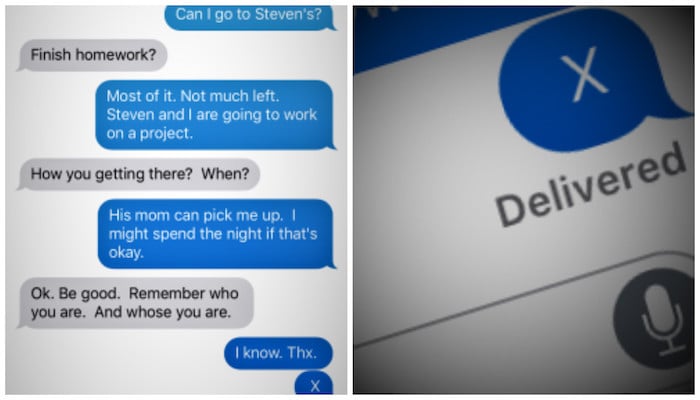
Around 14% of Australian 4-17 year olds and 20% of 15-19 year olds have mental health issues, according to Mindframe. The percentage of young people flagging mental health as a concern has doubled in the last six years.
Why are anxiety and depression so prevalent among our young people today and what can parents do to raise strong children, equipped to deal with the curveballs life throws at them?
These are the questions Sharon Witt addressed at a King's parenting seminar.
Sharon is an educator, broadcaster and author of numerous teenage self-help and parenting books. In October 2017, Sharon visited King's to speak to parents about the key skills and strategies children require in order to become resilient, strong and capable young adults.
For parents who missed out on Sharon's talk, here is a summary of her key points:
What is resilience?
Resilience is the ability to:
- bounce back after a negative experience or in a tough situation;
- adapt to difficult circumstances that you just can't change;
- continue to thrive despite current circumstances;
- learn from challenging experiences and become stronger for it.
'Bouncing back' is not something that happens immediately; it is a process that may take a period of time, like recovering from grief or a broken heart.
What are the top concerns for today's teenagers?
- Stress (44% of teens surveyed)
- School (38%)
- Body image (30%)
Source: Mission Australia's 2016 survey of 35,000 young people.
Why are Australian kids so stressed out?
They have things too easy
Last year, Sharon asked her Year 8 Health class why they think their age group is so anxious. One perceptive boy observed, "I think it's because we have everything we need. We don't know what to do when things go wrong."
Teenagers are looked after, protected and provided for. When things go wrong, they think it's the end of the world. They don't know how to manage failure. They often struggle to see beyond the moment. They lack the experience to put things into perspective and see the bigger picture.
Technology
This is a generation who are connected 24/7 - children who are always in touch with their friends, long after they've said goodbye at the school gate. This is a generation suffering from information overload, who are unable to wind down or 'switch off' and let their minds rest. In one of Sharon surveys, a quarter of Year 6 girls said that they were on social media for five hours a day!
Teen mental health issues have soared over the last six years. Instagram and instant message apps have been around for approximately the same time period. Coincidence?

How to help our children fill their 'resilience backpack'
Children need a secure base
Somewhere they can feel safe and secure.
Somewhere where they can talk and be listened to.
Ideally, this secure base should be the home. Parents should try and make their home a comfortable and relaxing space - and a safe place for other kids to hang out. (This has the added advantage of helping parents get to know their children's friends).
Sitting down for meals together regularly is important as this is the time when conversations emerge. Teenagers may not be communicative but they do want someone to listen to them - not necessarily to give them advice or to 'fix' things but to hear them out; sometimes they just want to 'vent'. While it's rare for teens to say to a parent, 'Can we talk?', keep an eye out for opportunities to be there for them. They may ask you to shoot hoops, go for a hike or play cards with them - these are the times they are likely to open up. Be there to listen.
Sometimes families go through difficult periods that prevent the home from being the secure base - eg during marital disharmony, mental illness, arrival of new baby or other disruptions to home life. Your kids' school, church, friend's or grandparents' house may be the place they go to feel safe while things are difficult at home.
Develop positive and significant relationships
"It takes a village to raise a child"
We are not meant to parent in isolation. Use your support network and lean on your community.
Sharon recounted how, when she was 15, she would regularly escape to the house of a loved Sunday school teacher whenever she fell out with her mum. Her teacher would call her mum to let her know she was safe, give Sharon dinner and let her stay over.
There are times when your child just doesn't want to be around you or when they need to talk about something with someone other than their parents. Help your child build a network of 'trusted adults' they can turn to should they not feel comfortable confiding in you.
Get to know the parents of your kids' friends if possible. You don't have to particularly like them but they may be invaluable at times when you need extra help, eg taxiing or feeding your children when you're stuck at work, or providing insights into your child's friendship group.
Could you be a 'trusted adult' to other people's kids?
Help your children to develop their social competencies
These might include:
- how to make friends;
- manners;
- trying again after making mistakes;
- dealing with bullies;
- coping with people they don't like;
- sharing;
- making conversation.
Instill positive values
How do kids learn? We model it.
Kids are more influenced by what we do than by what we say ... they watch!
So, if we want them to be generous, we have to show generosity. If we want our children to be good friends to others we need to model what that looks like. If we want them to have a healthy body image, we mustn't stand in front of the mirror, complaining about how fat and ugly we are all the time.
We can encourage altruism and help our kids understand causes beyond themselves by participating in voluntary work, charities and acts of spontaneous kindness, eg
- sponsoring a child oversees
- donating or raising money for charity
- helping neighbours out
- contributing to others
- participating in mission trips
- showing empathy and being thoughtful towards others
Help your kids to be good friends
Friendships are important - they make kids feel connected. Navigating friendships is a huge part of resilience.
To make a friend you need to be one first. We need to encourage our children to SMILE and be friendly and welcoming. We need to teach them how to deal with specific scenarios and understand that everyone has bad days.
Your children might make friends with kids you don't like but this all is part of letting them work things out for themselves. Don't ban them from seeing 'unsuitable' friends (unless it puts them in danger). You might just ask, "What do you like about that person?" or "Is that the sort of person you want to be?"
Maybe your child might be the good, positive influence on another child's life.
Encourage their talents and interests
Kids need talents and interests
When times get tough, hobbies and leisure activities provide a diversion from the things that worry and upset our children. They help kids escape, refocus and put things into perspective.
Try to find your children's 'spark': Help them to explore their interests. Notice what they enjoy and encourage them to try new activities. Ask them, "If you had a whole day to do anything, what would you do?".
It's important to nurture our children's interests and passions so they don't go straight on to social media or computer gaming after school. These activities are isolating and addictive and don't get them out of their bedrooms.

Be prepared to let your kids fail
Support your kids but don't do everything for them.
Don't be helicopter parent, hovering over them all the time, micromanaging them, worrying about every eventuality. Your kids won't starve if they forget their lunch, nor will they learn how to manage their study time if you are taking responsibility for it.
Don't be lawn mower parent, constantly clearing obstacles from your children's paths so that they never have to deal with problems themselves.
Aim to be a parachute parent - someone who is there to facilitate a soft landing when things go wrong.
Encourage healthy risk taking. We can't inoculate our children against bad things and shroud them in cotton wool but we can say, "It's OK, I'm here" and teach them to how to manage their mistakes.
Education
School provides an important support structure for resilience. Sharon advised parents to try to keep their children in education for as long as possible. Look at options for Years 11 and 12 rather than letting kids drop out of school entirely. These might include work placements, apprenticeships or trade training while staying on in school. At King's Trade Training Centre students can start earning money and learn a trade, all within the security of a relaxed school environment.
Try to help your children keep things into perspective. It's okay not to be brilliant at everything at school ... and they won't learn anything unless they are prepared to make mistakes.
Keep communication channels open with your children's teacher. Teachers can only deal with what they know; unless you inform them of difficulties or anxieties your child is experiencing, they cannot act on it.
Advocate for you child but don't fix things for them: Say, 'Shall we go and have a chat with your teacher about this together' rather than 'Right! That's it! I'm going to speak to your teacher!'. (The exception to this would be something serious like bullying where you must step in and speak to the school directly.)
Dealing with depression, anxiety and self-harm
Anxiety is a huge problem amongst teenagers, leading many to avoid school entirely.
Sharon's advice to parents is to encourage their children to:
- eat regularly
- get exercise (even a 20 minute walk round the block)
- use some relaxation strategies, eg
- listen to quiet music
- do some craft, doodling, colouring in
- take a long, soaky bath
- read
- meditate
- breathe slowing and deeply
If a child is anxious or depressed for longer than two weeks, Sharon recommends parents take them to a GP.
Provide an exit strategy
Work out an escape plan with your child, in case they ever find themselves in a difficult or compromising situation they need to get away from fast (eg they find themselves at a party where there are drugs being passed around or they feel unsafe at a friend's house).
Sharon recommended the X-Plan: If your child is ever in a situation that makes them uncomfortable, they text the word 'X' to their parent (or any pre-arranged 'code') and the parent will phone them back, tell them something important has happened and that they have to come home immediately. Obviously, the code, the script and the action need to be decided in advance by both parties. Alternatively, your child could include a specific emoji in a text message to you, which might be your cue to collect them from a pre-arranged location.

The important thing is to be there for your child when they are in trouble and to be able to get them out of a difficult or dangerous situation. You can yell and scream at them and deal with the consequences later, if necessary, but in times of need your child must know they can depend on you and that you have their back.
The most important thing you can do
Sharon stressed that, if the parents only took one thing away from the seminar, she hoped it would be this: From a very young age we should tell our children,
"Nothing, nothing is so bad that you cannot tell a trusted adult or come and tell me, that we can't work through together. Nothing that can happen to you or that someone can do to you or you can do is so bad that you can't come and tell me."
However, it is essential that parents follow through on this and respond faithfully. If your child does confide in you, don't respond by yelling, grounding them, confiscating their phone etc. Be calm, listen to them and help them to work things through. Be prepared to get up at three in the morning to listen to the concerns that are keeping them awake. Put your anger and shock to one side to help them manage the consequences of their actions.












